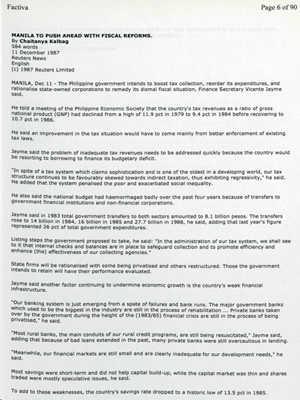MANILA TO PUSH AHEAD WITH FISCAL REFORMS
[Reuters]
Published date: 11th Dec 1987
11 December 1987
Reuters News
English
(c) 1987 Reuters Limited
MANILA, Dec 11 – The Philippine government intends to boost tax collection, reorder its expenditures, and rationalise state-owned corporations to remedy Its dismal fiscal situation, Finance Secretary Vicente Jayme said
He told a meeting of the Philippine Economic Society that the country’s tax revenues as a ratio of gross national product (GNP) had declined from a high of 11.9 pct in 1979 to 9.4 pct in 1984 before recovering to 10.7 pct in 1986.
He said an improvement in the tax situation would have to come mainly from better enforcement of existing tax laws.
Jayme said the problem of inadequate tax revenues needs to be addressed quickly because the country would be resorting to borrowing to finance its budgetary deficit.
“In spite of a tax system which claims sophistication and is one of the oldest in a developing world, our tax structure continues to be favourably skewed towards indirect taxation, thus exhibiting regressivity,” he said. He added that the system penalised the poor and exacerbated social inequality.
He also said the national budget had haemorrhaged badly over the past four years because of transfers to government financial institutions and non-financial corporations.
Jayme said in 1983 total government transfers to both sectors amounted to 8.1 billion pesos. The transfers rose to 14 billion in 1984, 16 billion in 1985 and 27.7 billion in 1986, he said, adding that last year’s figure represented 26 pct of total government expenditures.
Listing steps the government proposed to take, he said: “In the administration of our tax system, we shall see to it that internal checks and balances are in place to safeguard collection and to promote efficiency and enhance (the) effectiveness of our collecting agencies.”
State firms will be rationalised with some being privatised and others restructured. Those the government intends to retain will have their performance evaluated.
Jayme said another factor continuing to undermine economic growth is the country’s weak financial infrastructure.
“Our banking system is just emerging from a spate of failures and bank runs. The major government banks which used to be the biggest in the industry are still in the process of rehabilitation … Private banks taken over by the government during the height of the (1983/85) financial crisis are still in the process of being privatised,” he said.
“Most rural banks, the main conduits of our rural credit programs, are still being resuscitated,” Jayme said, adding that because of bad loans extended in the past, many private banks were still overcautious in lending.
“Meanwhile, our financial markets are still small and are clearly inadequate for our development needs,” he sald.
Most savings were short-term and did not help capital build-up, while the capital market was thin and shares traded were mostly speculative issues, he said.
To add to these weaknesses, the country’s savings rate dropped to a historic low of 13.5 pct in 1985.
Jayme said the country’s stock markets would grow only if closely held companies were encouraged to list their shares.
“As events after the February (1986) revolution show, our institutions are inflexible, resistant to change … (they) seem to have lost the ability to strike compromises, the very foundation of social stability,” he said.
“We cannot afford to wait for manna from heaven to fall on our laps. Development is not a product of the action of leaders, it comes from the collective action of a society.”






